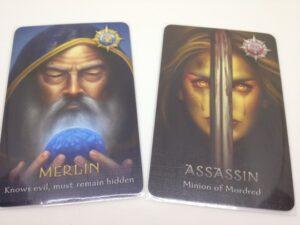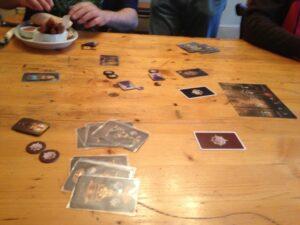For my very first critical play, I played a physical version of Avalon by Don Eskridge with a group of friends. The game seems to target a demographic of ages 12+, who have probably played Mafia or another similar deception game and are looking for a fun and intelligent twist involving a fantasy setting.
Avalon is a social deception game that can be played with 5 to 10 players. Depending on the number of players, the game can become more complex, with more or fewer special role cards. At the beginning of the game, each player receives a role card that is either fundamentally good (allies of Arthur) or evil (allies of Mordred). Some role cards grant players special abilities, such as Merlin and Percival for the good team, and Mordred, Morgana, Oberon, and Assassin for the evil team. The game is structured around a series of quests, with each team aiming to claim each quest. There are five potential quests, and a team must be selected for each one. Once a team is proposed, all players vote on whether the team is allowed on the quest. The selected team members then get to secretly vote on whether the mission succeeds or fails. If any mission receives at least one “fail” card, the evil team claims that quest, otherwise it is counted for the good team. Victory is found by claiming three quests, but the evil team can still win by killing Merlin with the assassin role, even after the good team has won three quests.
Comparing Avalon to other games in its genre, such as Mafia, Avalon differentiates itself by having a more structured and strategic gameplay. Players have clearly defined roles and objectives, and there is a greater emphasis on deduction and bluffing rather than pure luck. Additionally, peripheral players (e.g. townspeople) have a larger role than in other deception games, making the game more engaging for more players. Furthermore, there is no “night” system, meaning no players are eliminated from the game, and the game also introduces a redemption mechanic given to the evil team even if the good team successfully passes all the quests.
I personally enjoyed playing Avalon, even though I received standard “townspeople” cards and had no special abilities. The game mechanics are simple enough to get invested quickly, while still creating a structure for lots of conflict and suspense. The game’s quality is measured in the extremes of emotion it produces, and there were definitely a lot of extremes in the game we played. The good team had an amazing win at the end, where early on in the game, one player claimed to be Percival and identified Morgana, creating a successful persona of Merlin that deceived the evil team.
If I were to modify a component of the game, I believe it would be captivating to add an extra specialty role to the good team, given the current imbalance of specialty roles. A fascinating alternative could be a variation of the Oberon role, where one good player appears as evil to Merlin, creating some uncertainty that Merlin must navigate throughout the game. As for other alterations, it might be intriguing to impose a formal time limit, which would add chaos and excitement to the discussions between each round. Nonetheless, Avalon’s strength lies in its capacity to generate extensive conversations, and implementing a time restriction could potentially diminish the quality and humor of those interactions.




